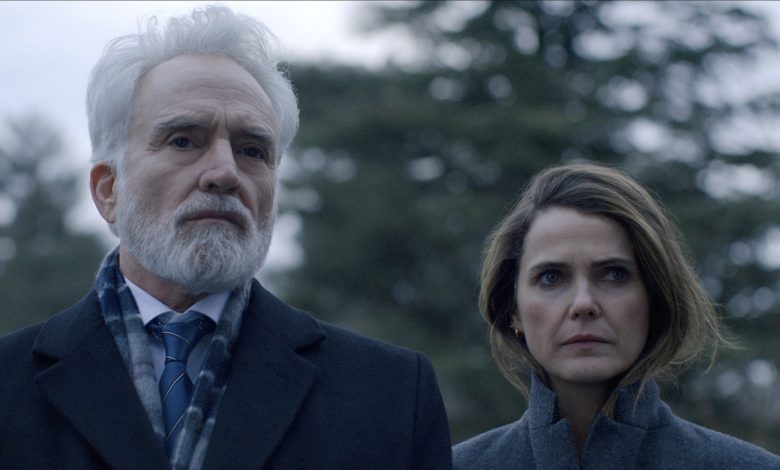‘The Diplomat’ Team Explains “Bone-Chilling” Season 3 Cliffhanger, Promises More Allison Janney and Bradley Whitford in Season 4

[This story contains major spoilers from season three of Netflix‘s The Diplomat, including the finale “Schrodinger’s Wife.”]
After two seasons of cliffhanger finales where central characters’ fates hung in the balance, The Diplomat has opted for a less explosive, more subtly dramatic ending — but one with major international ramifications.
In the closing minutes of season three, Keri Russell‘s American ambassador to the U.K., Kate Wyler, has a tearful reconciliation with her husband Hal (Rufus Sewell), from whom she’d had a private divorce for most the season, with Kate embarking on an affair with a spy named Callum (Aidan Turner). Callum told Kate the Russians retrieved their lost submarine carrying a nuclear weapon, which the U.S. and U.K. had been strategizing about how to deal with, after it was located off the British coast. But the weapon isn’t there anymore, which he then interprets as the Russians taking it; and Kate thinks otherwise.
After a season littered with examples of how Kate and Hal can read each others’ minds, she asks her husband, now also the vice president to Grace Penn’s president (Allison Janney), “Did you take it?” She then outlines the various reasons why such a move would be geopolitically reckless before Hal tells Grace that his wife knows. Meanwhile, Bradley Whitford’s Todd Penn, Grace’s husband, is worried his wife is having an affair with Hal and looks at their discussion about the nuke through jealous eyes as he offers the loaded, “Nothing to worry about, right?”
Speaking about the decision to end with that revelation, The Diplomat showrunner Debora Cahn tells The Hollywood Reporter she “was excited to have a more existentially hanging cliff.”
“It felt important to look at problems that were not just creating individual struggle for our characters but also creating national, global struggle,” Cahn adds, before quipping. “You can’t blow somebody up all the time. Sometimes you have to deal with with the subtleties of tectonic shifts in world powers.”
Janney, who memorably said she literally threw the season two finale script across the room when she encountered its shocking ending, calls the season three ending “bone-chilling.”
“To have made this unbelievable, dark and secret decision — and seeing that Kate knows, just by looking at her, I know she’s going to be trouble for us,” Janney says. “I know season [four] is going to start with that secret. There’s lots of secrets in this show, lots of decisions being made behind a closed door, and then behind another closed door… it makes for very, very compelling drama.”
Janney adds the moment shows a similarity between Grace and Hal, and that Grace like Hal, the latter who’s known for some controversial foreign-policy tactics of his own, is a “risk taker” who is “not afraid to make big bold decisions.”
She says, “I was trying to think if Hal came up with the idea to take the nuke off the sub, or if I did, and I think whoever did, we both were like, ‘Yes, let’s do it. That’s a risk worth taking.’ When you think about what it means to save the world from nuclear war, it’s those kinds of decisions that presidents make.”
Sewell agrees with Janney’s assessment that they share an “ends justify the means” approach.
“These are slippery decisions. This is realpolitik,” Sewell says of Hal and Grace’s make. “The amount of people who felt, and have felt in our history, that the safest place to be is inside the tent pissing out, to be at your closest to the dangerous person is politically expedient, etc., I think he really does truly believe he can help by being there. There are things that Grace Penn can do that would be good; there are things she can do that can be bad, and I think he just believes in being in the room.”
Meanwhile, Russell says this move is something her character would never do.
“That’s the thing about Kate. She’s a true public servant; she is a civil servant of the government,” Russell tells THR. “She loves the country, she believes in it. She really is one of those true people. I don’t think she is corrupted by power. That’s what’s great about her. This is a crazy line to cross that I do not think Kate would ever make, and Hal is easier with those blurry choices.”
As for what this means for The Diplomat‘s already ordered fourth season, Russell has “complete faith” in Cahn but doesn’t quite know what to expect.
“I think it’s going to be tough. Who knows what Debora is going to do with it? I have complete faith. But I think it certainly puts [Hal and Kate’s relationship] in a crazy position, because after the vulnerability of trying to patch it up and then to end with this? Oh, my God. How are they gonna get themselves out of this one?”
Cahn adds that the moment reveals a new dimension of Hal to Kate, right after they’ve reconciled.
“We wanted to bring the characters to a place where, just when they felt like they were on solid ground again, the lens shifts and Kate is seeing something new in Hal that she hadn’t anticipated and believing that she, after decades with this person, understood what she was getting, and then finding out that the game keeps shifting, no matter how much time you commit yourself to having it stand still.”
Whitford also finds it amusing that his character is jealous in a moment with such dangerous stakes.
“It’s a big can of worms. And it made me laugh because there is this incredibly important reveal that has huge consequences for the future of the world, and I’m jealous,” he says, laughing. “It’s all kind of going over my head, but in terms of the story, it leaves wild possibilities in a very different way from the end of season two, which was such a shock.”
Both Whitford and Janney have been upped to series regulars for next season, and Cahn says those who work on the show “just wanted more” of the couple, particularly when they could play off Kate and Hal.
“It was such a treat to have the four of them together, to be able to look at Keri and Rufus and Allison and Brad working together. It’s like the greatest game of doubles tennis you’ve ever seen,” she says. “And it’s really fun for all of them. It’s fun to be able to give Keri and Rufus people to play with who are at their level and ready to throw down in the way that they are with each other. That was really gratifying, and we just wanted to keep doing it. I felt like we, through an accident of nature, managed to get this incredible number of natural resources in one place at one time, and we just had to take advantage of that. They like working with each other. We love watching them work together, and that’s true on like every axis of the foursome. We just wanted more.”
Whitford and Janney say they hadn’t even seen the plan for the first episode of season four and were reluctant to speculate about what they hoped for from their characters but, like Russell, have a great level of trust in their showrunner.
“We have no idea what’s coming, but I know it’s got to be more, more mess for these characters personal lives for sure and more complicated geopolitical concerns and messes they have to deal with,” Janney says of what comes next. “I think it’s going to be Debora at her best taking this over the next season, and I just hope for more really brutal, brutal decisions to have to make, and the consequences of that with your personal lives and all of that muddled together is what’s great about this show.”
Whitford adds, “We’re both great beneficiaries of writers. Really talented, brilliant writers set free. It wouldn’t occur to me to go to Debora to tell her where I wanted this character to go because it’s been absolutely thrilling and surprising and beyond my wildest expectations so far. It’s why you sign up for and are thrilled to be in a situation like this because you trust that storyteller in charge.”
Whitford does, though, know that Todd is not handling his wife’s ascension to power particularly well, as viewers saw glimpses of in the season four finale.
“This guy has fancied himself — he’s completely in love with a powerful, ambitious woman in politics, and I think in his head, he thinks he would be ready for this,” Whitford says, joking he imagined his first gentleman as being “sort of like Doug Emhoff, if he wasn’t so gracious and absolutely unabashedly thrilled about the prospect.”
“But I think the way it comes down reveals his absolute inability to deal with this kind of flip of the gender norm,” he continues, “where he will be in the background, putting his career on hold in the service of his wife, and there’s a lot of contradictions in there because I think he’s very protective and he’s deeply in love with her, but I don’t think he knows how to deal with this yet.”
Janney, meanwhile, is aware of how her character’s gender likely prompts more scrutiny of her leadership.
“I’m probably, as a female president, judged more harshly for the hard decisions I make — as women in this world are judged more harshly for being able to to take a stand like that,” Janney says, adding of Grace. “She’s up to the task of doing this.”
But that sort of external sexism toward a female president is not something viewers catch wind of in season three.
When asked if it was intentional to omit showing outwardly sexist responses to a female president, Cahn says, “I think there was probably a little bit of relief in the idea that perhaps we could move forward without it. Whenever possible, I write all the characters in ways that I would understand the story and that I would read the story in a viable way if the genders were flipped, like the way that I write women and the way that I write men, in many ways, are quite similar. I liked the idea of looking at Grace in the presidency simply as a person in the presidency, and then making the shift into: Who is she in her marriage? So that we could see what her profession was doing to her life and what it means to be a wife in a role like that, and how it plays out in the marriage more than how that plays out in the workplace.”
As for Hal and Kate’s decision to undertake a private divorce while staying married publicly, Russell indicates that Kate felt it was time.
“I feel like it was just a step too far,” Russell tells THR. “Also the fact that Kate has consistently made choices to follow Hal’s career. And Hal wanted this enough that he wanted the lead and she didn’t want to follow this time. So I think she just she’s tried and tried and tried and it didn’t feel good, so she’s going to try this and see how this feels.”
Sewell, though he proposes the split, says Hal likely hoped the two would reunite, as they do at the end of the season.
“There’s a sense that you can go through a pattern of breaking up and getting back together, and you can think that is your relationship, and that’s why you get used to very dysfunctional levels,” Sewell says of how the time had come for the Wylers to take a break. “At the back of his mind, there is always a hope without the person. He loves his wife very much. He hopes that if he can half mean it, then there will be that thing of you showed you don’t need it so you can have it — that kind of Willy Wonka-like thing where someone will see that you don’t need something anymore so you get to have it. There’s a part of him like that. But also, there is no way that he can be vice president if they’re not married. She’s had affairs in the past, so this is something they’re not particularly physically possessing about each other. I don’t think he’s a cynical ploy, but at the same time, behind it, there is always the hope that they will get back together.”
Cahn adds that the private divorce gives Kate what she wants, but also forces her to grapple with some of her own psychological issues.
“She struggled so mightily against what she considers on the problems in her life that she lays at his feet,” Cahn tells THR. “So it seemed important to go through the process of her — she said since the pilot she wanted a divorce — where she finally gets what she wanted, and the discovery that you can leave a relationship, but you will have to still bring yourself with you, I think, is a really haunting one.”
***
All three seasons, including the eight-episode third season, of The Diplomat are now streaming on Netflix. Read THR‘s earlier season three interview with Keri Russell.
Source: Hollywoodreporter
HiCelebNews online magazine publishes interesting content every day in the TV section of the entertainment category. Follow us to read the latest news.





